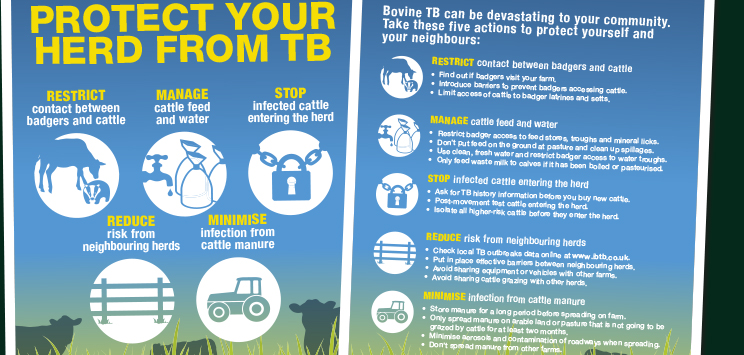Advice in the leaflet called “Protect Your Herd From TB” was sent out by the government’s Animal and Plant Health Agency with contact details for the TB Advisory Service, which is funded by DEFRA and provides farm visits to discuss bovine TB.
One of the farmers who received the leaflet was Doug Hawkins, who keeps between 50 and 75 beef suckler cows and young stock at any one time on just over 90 acres at Alehouse Farm, East Sussex. In a series of angry emails to the advisory service, he described the leaflet as showing “staggering ignorance,” and a “waste of tax payers money.” And he asked: “What does it say about the state of farming in our country that such nonsense is sent out as advice?”
The leaflet was meant to be a five point biosecurity plan for the prevention of TB. But Mr Hawkins singled out the leaflet’s advice to “introduce barriers to prevent badgers accessing cattle.” He asked how farmers are supposed to do this. “Is it suggested that we imprison badgers within their setts, cut off their access to food and water or create security zones on our farms where badgers can roam sustainably and cattle cannot?
“(Or should we) establish security fencing around the entirety of our farms with the consequential impact on all forms of wildlife – and at what expense?” He wondered whether any cattle farm would be able to afford this and what impact it would have on rural landscapes.
He also asked how farmers are supposed to limit cattle access to badger latrines when nearly every field on Alehouse Farm has one. “(Should we) fence them off, with only badger access possible?”
Replying to the emails – which Mr Hawkins forwarded to South East Farmer – Sarah Tomlinson from Westpoint Farm Vets in Ashbourne, Derbyshire, says she can understand Mr Hawkins’s frustration. “TB has been government controlled for so long farmers have lost the belief that they can do anything to make a difference to whether they get TB or not,” she wrote. Ms Tomlinson – who is part of the TB Advisory Service and is a farm vet – urges Mr Hawkins to consider a visit so that the issues he has raised can be discussed. In the end, Mr Hawkins agrees to a visit if it is free of charge, and Ms Tomlinson suggests that an experienced advisor may be in Mr Hawkins’ area early in October.
Mr Hawkins insists that vets who have been servicing the Alehouse Farm for the last 30 years “deride the current testing regime” for bovine TB which is “extremely inaccurate” and the cause of “considerable distress and inconvenience to farmers. These vets ask why a proven blood testing regime is not adopted.”
Speaking to South East Farmer, Mr Hawkins said Alehouse Farm had never been shut down due to bovine TB, although there are thousands of badgers on the farm and it is subject to annual and pre movement testing. “If badgers are the primary vector for bovine TB, then I am heading for a problem,” he said.




